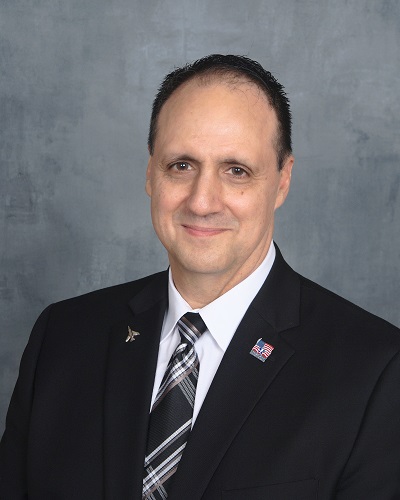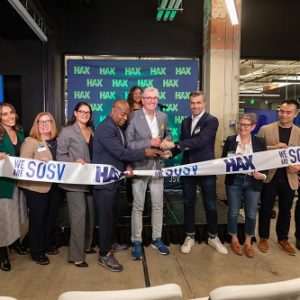Air Taxi Developer in our Own Back Yard! Interview: Kaydon Stanzione, CEO of Glassboro-Based Jaunt Air Mobility
Recently, NJTechWeekly.com contributor Johnathan Grzybowski interviewed Kaydon Stanzione, CEO of Glassboro-based aviation technology company Jaunt Air Mobility.
We thought we’d take a step away from digital tech to talk about this high-tech company in South Jersey that is developing piloted and autonomous flying aircraft that rise and land vertically. Jaunt is also a partner with Uber in its quest to make aerial ride sharing commercially available.
Q: What does your company do?
Jaunt Air Mobility is an aerospace company focused on developing advanced air vehicles called “VTOLs” [vertical take-off and landing], which incorporate innovative technologies and management strategies, providing the highest levels of operational efficiencies, reduced noise, safety and community acceptance. We design and build piloted and autonomous flying aircraft that improve how people and packages seamlessly move within urban, suburban and rural environments.
Jaunt Air Mobility is the pioneer and leader in Reduced Rotor Operating Speed Aircraft (ROSA) design and development. ROSA technology is the metamorphosis of the best features available from helicopters and fixed-wing airplanes. Jaunt Air Mobility was named a partner in the Uber Elevate Network, which seeks to make aerial ride sharing commercially available.
Jaunt Air Mobility’s goal is for its prototype of an all-electric vertical takeoff and landing (eVTOL) air vehicle to be finished by 2023 and available to riders in 2025.
Q: How did you start the company?
Jaunt Air Mobility was started in April 2018. However, the groundwork and research were underway well before then. Jaunt Air Mobility acquired, not licensed, all the intellectual property related to Carter Aviation’s slowed-rotor technology. In 2005, I was called upon by a Department of Defense agency to review Carter’s slow-rotor technology for a military mission role. However, the technology and manufacturing were too immature at the time to provide a feasible near-term solution.
Fast forward 10 years, I discovered that no OEM [original equipment manufacturer] had acquired or partnered with Carter. I started to reexamine the technology for potential helicopter air ambulance operations. In 2017, Dr. Dan Schrage, of the Georgia Institute of Technology, introduced me to Jay Carter [founder of Carter Aviation]. I also learned that a former coworker and friend, Martin Peryea, who is Jaunt’s CTO, was intimately knowledgeable about slowed-rotor engineering. We worked together and formed Jaunt Air Mobility in April 2018. Within two months, we were selected as an Uber Air Taxi partner.
Q: How did the initial funding get the business off the ground?
Our management team consists of entrepreneurs with experience in technology development and business management. Jaunt Air Mobility is currently self-funded, and continues to examine funding profiles suitable for full program lifecycle management. Program elements include air vehicle design, flight demonstration, certification, manufacturing, operations and supportability.
Q: How does technology help your business?
The development of distributed electric propulsion and all the associated electric powertrain technologies are key factors. However, they are one subsystem of systems. Advanced materials, avionics, flight computers and fly-by-wire systems are equally important. I say that because I believe the strongest chain is only as good as the weakest link. Jaunt recognizes these critical technologies and is working with world-class Tier 1 aerospace manufacturing partners that offer us minimal risk and cost while maximizing safety throughout Jaunt’s life cycle.
Q: How do you compare the current modes of transportation with those of the future?
Urban Air Mobility isn’t a new concept, but rather a new moniker put to an old idea of efficient personal transportation. When examining the transportation modes of the future, conceptually the transit options are land, air, sea and rail. The United States has not developed high-speed rail and water-borne transportation systems to the level deployed overseas, such as in Europe and Japan. Land-vehicle technology initiatives, as well as airborne drones, are moving toward autonomy. Furthermore, blended vehicle concepts such as flying cars and air taxis promise to offer greater convenience and reduced travel times focused in and around urban areas. Jaunt is a leader in carving out the future of transportation. Fully developed air-taxi flight operations have proliferated throughout the United States and abroad, and there will be an evolutionary process over the next 30 years. However, the enabling technologies promise to accelerate growth in aircraft designs and adjacent product development. Modular infrastructure suitable for air-taxi operation platforms will eventually minimize, and in many areas eliminate, the need for land transportation at locations of take-off and landing.
Q: How eco-friendly are your vehicles?
Jaunt is an all-electric aircraft with a zero carbon footprint. Alternatively, powering Jaunt with an internal combustion engine would release about five tons of carbon dioxide annually. But air quality is just one aspect of the eco-friendly advantages offered by Jaunt. Its advanced propulsion, featuring our patented ROSA technology, operates at a “whisper quiet” noise level that is not only lower than that of fixed-wing aircraft, but is acceptable to residential communities. Jaunt also has no combustible liquids, thus eliminating fire hazards in the air or on the ground.
Q: Could a middle-class family/professional afford this type of lifestyle, or is it primarily for the 1%?
Whether flying passengers or making package deliveries, Jaunt offers a very attractive travel option. Jaunt’s management team remains focused on the entire aircraft life cycle — from development to manufacturing, operations and supportability. This multidisciplinary approach is optimized for maximum safety and affordability. Jaunt is working with premier aircraft operators, support, and maintenance organizations to minimize direct operating costs. These savings result in the lowest passenger ticket and package costs. In addition to minimizing ticket pricing, Jaunt is working with community leaders and businesses to provide travel vouchers and commercial incentives. Large shopping malls and complexes are motivated to subsidize ticket prices to attract consumers from locations typically beyond reasonable driving distances. Jaunt also works with commercial centers, motor pools and other infrastructure providers to address transit considerations between origins and destinations and Jaunt landing facilities.
Q: What is your strategy for continuing the scaling process?
Jaunt continues to stay on the path of its business plan. The company is focused on growing its partner network, which is necessary to manufacture, operate and support our aircraft. We employ the latest in digital technologies to create a seamless interface between our multidisciplinary partners, which eliminates data transfer errors. We are not simply trying to build a prototype, but, rather, to build a sustainable aircraft business that moves people and packages in urban and remote areas around the world. We are leveraging our strong partnership with Uber, which is our launch customer. Uber also provides Jaunt with critical business modeling, in which we merge our operations and support partner data to identify specific operational territories that offer high-revenue opportunities. Jaunt is positioned to support Uber within its Uber Air launch markets in Dallas, Los Angeles and Melbourne, Australia.
Q: How can the NJTechWeekly.com community help you and your business?
Jaunt’s primary efforts to date have been focused on securing major systems manufacturing partners. Today, Jaunt seeks support in the areas of subsystems, engineering services, operations, maintenance and pilot training. We have a strong interest in artificial intelligence, autonomy, high-speed computers and aircraft-grade electric motors and batteries. New Jersey has innovative research programs in several of these areas — at Rutgers, NJIT, Rowan and other schools. We welcome the opportunity to work with NJTechWeekly.com to educate our local academic institutions, businesses and state agencies about urban air mobility. By fostering a better understanding of the enabling technologies, processes, and business and financial issues, NJTechWeekly.com can serve as a centralized resource for informing all parties vested in urban air mobility.


